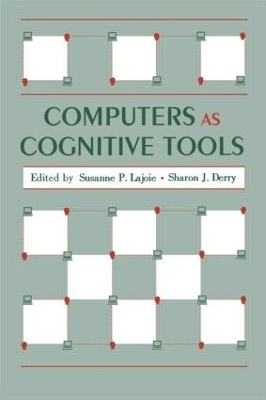
Computers As Cognitive Tools
Routledge (Verlag)
978-0-8058-1082-0 (ISBN)
Highlighting and illustrating several important and interesting theoretical trends that have emerged in the continuing development of instructional technology, this book's organizational framework is based on the notion of two opposing camps. One evolves out of the intelligent tutoring movement, which employs artificial-intelligence technologies in the service of student modeling and precision diagnosis, and the other emerges from a constructivist/developmental perspective that promotes exploration and social interaction, but tends to reject the methods and goals of the student modelers. While the notion of opposing camps tends to create an artificial rift between groups of researchers, it represents a conceptual distinction that is inherently more interesting and informative than the relatively meaningless divide often drawn between "intelligent" and "unintelligent" instructional systems.
An evident trend is that researchers in both "camps" view their computer learning environments as "cognitive tools" that can enhance learning, performance, and understanding. Cognitive tools are objects provided by the instructional environment that allow students to incorporate new auxiliary methods or symbols into their social problem solving which otherwise would be unavailable. A final section of the book represents researchers who are assimilating and accommodating the wisdom and creativity of their neighbors from both camps, perhaps forming the look of technology for the future. When the idea of model tracing in a computer-based environment is combined with appreciation for creative mind-extension cognitive tools and for how a community of learners can facilitate learning, a camp is created where AI technologists and social constructivist learning theorists can feel equally at home.
Susanne P. Lajoie, Sharon J. Derry
Contents: S.J. Derry, S.P. Lajoie, A Middle Camp for (Un)Intelligent Instructional Computing: An Introduction. Part I:Model Builders.K.R. Koedinger, J.R. Anderson, Reifying Implicit Planning in Geometry: Guidelines for Model-Based Intelligent Tutoring System Design. V.J. Shute, A Comparison of Learning Environments: All That Glitters... M.R. Lepper, M. Woolverton, D.L. Mumme, J-L. Gurtner, Motivational Techniques of Expert Human Tutors: Lessons for the Design of Computer-Based Tutors. S.J. Derry, L.W. Hawkes, Local Cognitive Modeling of Problem-Solving Behavior: An Application of Fuzzy Theory. Part II:Non-Modelers.K. Reusser, Tutoring Systems and Pedagogical Theory: Representational Tools for Understanding, Planning, and Reflection in Problem Solving. G. Salomon, On the Nature of Pedagogic Computer Tools: The Case of the Writing Partner. R. Lehrer, Authors of Knowledge: Patterns of Hypermedia Design. S.D. Teasley, J. Roschelle, Constructing a Joint Problem Space: The Computer as a Tool for Sharing Knowledge. Part III:Bridging Differences in Opposing Camps.S.P. Lajoie, Computer Environments as Cognitive Tools for Enhancing Learning. S. Katz, A. Lesgold, The Role of the Tutor in Computer-Based Collaborative Learning Situations. L. Schauble, K. Raghavan, R. Glaser, The Discovery and Reflection Notation: A Graphical Trace for Supporting Self-Regulation in Computer-Based Laboratories. Part IV:Discussants.S.F. Chipman, Gazing Once More Into the Silicon Chip: Who's Revolutionary Now? A. Lesgold, Information Technology and the Future of Education.
| Erscheint lt. Verlag | 13.7.1993 |
|---|---|
| Reihe/Serie | Technology and Education Series |
| Verlagsort | New York |
| Sprache | englisch |
| Maße | 152 x 229 mm |
| Gewicht | 544 g |
| Themenwelt | Schulbuch / Wörterbuch ► Unterrichtsvorbereitung ► Unterrichts-Handreichungen |
| Informatik ► Grafik / Design ► Digitale Bildverarbeitung | |
| Informatik ► Theorie / Studium ► Künstliche Intelligenz / Robotik | |
| Sozialwissenschaften ► Pädagogik | |
| ISBN-10 | 0-8058-1082-X / 080581082X |
| ISBN-13 | 978-0-8058-1082-0 / 9780805810820 |
| Zustand | Neuware |
| Haben Sie eine Frage zum Produkt? |
aus dem Bereich


